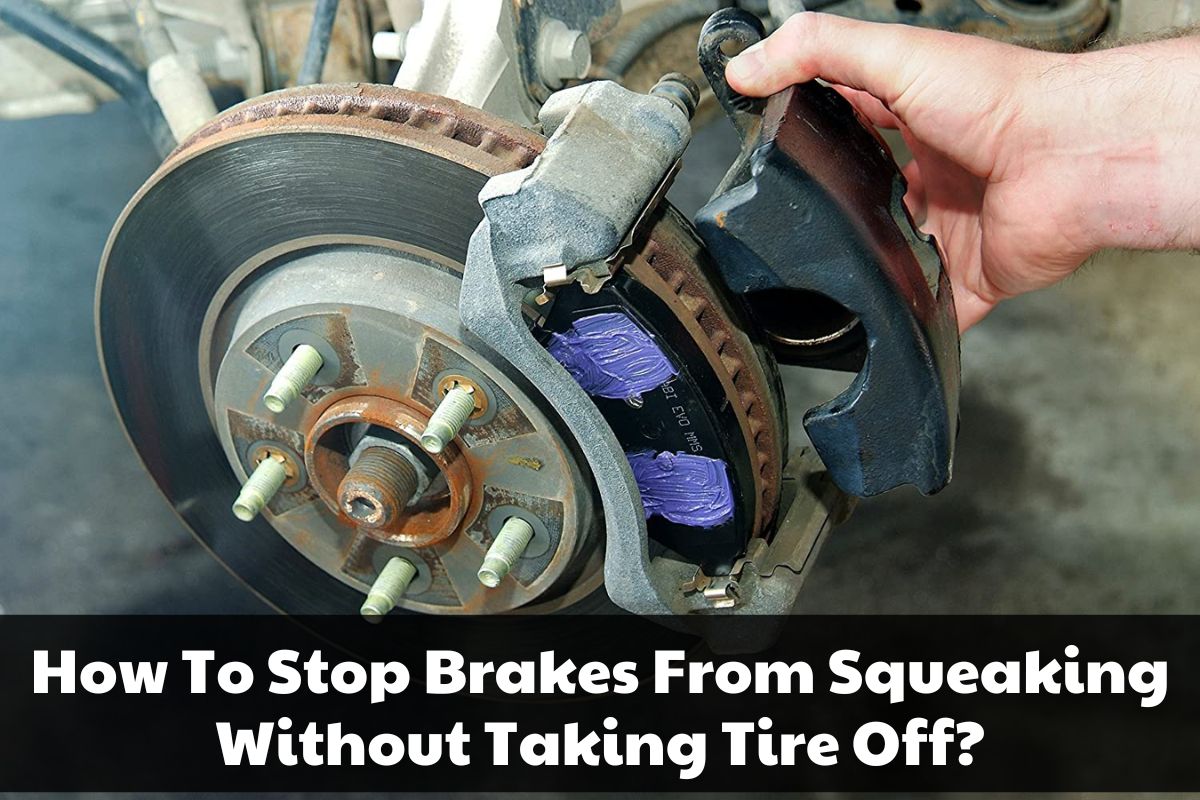If you’re constantly bothered by the sound of your car brakes squeaking, it can be quite frustrating and even distracting while driving. Fortunately, there are ways to address this problem without the need to take off your wheels and tires.
In this blog post, we’ll provide you with some valuable information on why brakes squeak and offer tips on how to stop brakes from squeaking without taking tire off. So, if you’re looking for a solution to your squeaky brake problem, keep reading to find out more!
3 Ways To Get Rid Of Brake Squeak Without Taking Off The Tire
While it’s always recommended to have a professional mechanic diagnose and fix brake problems, here are three methods that may help get rid of brake squeak without removing the tire:

Greasing And Shimming Brake Pads
One solution is to grease the contact points on your brake pads and caliper carrier. This should eliminate any squeaking noise caused by friction. Remember to avoid getting any grease on the rotors or pad surface, as it may harm their function.
Alternatively, sometimes vibrations can cause brake pads to squeak. If that’s the case, installing a set of shims can eliminate vibrations and snugly fasten the brake pads to the brake calipers. Shims typically contain a layer of rubber that helps to reduce any unwelcome noise.
Related: How Long Do Rotors Last?
Clean Brake Dust With A Garden Hose
With just a brake dust cleaner and a garden hose, you can easily clean the brake dust and eliminate those pesky squeaks. Just make sure to choose a brake dust cleaner that is effective and non-toxic to avoid any damage to your wheels.
Once you have your cleaner, wait until your brakes have cooled before spraying the cleaner onto the wheels and brake caliper. After a few minutes of foaming, rinse it all off with a good soak from the garden hose
Clean Glazed Brake Pads
One solution may be to clean glazed brake pads. To do this, wet them with isopropyl alcohol and sand them with 280 to 320 grit sandpaper on a granite stone or concrete slab. Alternatively, you can try scuffing them on concrete sidewalks or asphalt surfaces to deglaze them.
However, as someone who has experienced the headaches of glazed brake pads damaging the brake rotor, I would advise you to consider just getting new brake pads instead. Not only can glazed pads damage the rotor, but a damaged rotor can result in an expensive fix in the long run.
Why Are My Brakes Squeaking?

There are many reasons why your brakes might be squeaking. In some cases, the cause is relatively harmless, while in others, it could indicate a more serious problem. Here are some possible reasons why your brakes are squeaking:
Surface Rust or Corrosion
There are many reasons why your brakes might be squeaking, which can vary from harmless to serious issues. One possible cause is surface rust or corrosion on the rotors. This can occur due to recent rain or snow, humid weather, or even driving on unpaved roads.
The noise you hear is the brake pads scraping off the rust, or dirt particles being wiped away by the brake pads. Fortunately, if this is the problem, you won’t need to panic as the squeaking should cease after a few applications of the brake pedal.
Worn Brake Pads
Over time, the pads on your brakes wear down, and a small tab begins scratching the rotor, creating a continuous squeaking noise. This is actually a built-in wear indicator that alerts you it’s time for a replacement. However, not all wear indicators are the same and some might only squeak as you come to a stop.
Additionally, uneven rotor wear can cause the brake pads to make suboptimal contact, creating noise and vibration when you apply your brakes.
Unevenly Worn Brake Pads
When your brake pads become worn in an uneven way, they can no longer fit flush against the rotors, resulting in that telltale squeak. But don’t despair! This problem can be easily remedied by a qualified mechanic. Often, brake pads become insecurely mounted or the shims that hold them in place become loose, causing the unpleasant sound.
Moisture
Another common cause of squeaking brakes is moisture that gets between the brake pads and rotors. This usually happens when you drive through a puddle or when it’s raining, and can cause your brakes to make noise until they dry out.
In this case, apply some rust preventive lubricant (such as WD-40) on the brake pads and the rotor surface to help prevent any further corrosion. If necessary, replace your old brake pads with new ones.
Worn Brake Calipers
Finally, worn brake calipers can also be a culprit when it comes to squeaking brakes. The caliper houses the brake pads and helps keep them pressed against the rotors. When the caliper is worn, it may no longer be able to hold the brake pads securely in place, resulting in noise as you apply your brakes. A professional should check your brake calipers and replace them if necessary.
Related: How Long Do Brake Pads Last
Where Do I Lube Brake Pads?
To lubricate brake pads properly, first, make sure you are using the right lubricant – one that is specifically designed for high heat. Secondly, avoid applying lubricant on the friction face of the brake pad or rotor, or on the inside of any drum housing.
Instead, apply a small amount of dry lubricant to the points where the brake pad contacts the caliper and/or pins. And if you’re looking for a solution to prevent or eliminate brake squeal, try using a brake squeal spray.
Can WD40 Stop The Brake From Squeaking?
The answer is yes, with regular use of WD-40 Automotive Specialist Brakes & Parts Cleaner, you can not only prolong the life of your brake discs and pads but also potentially cut out that unpleasant brake noise.
Will Brake Fluid Stop Brake Squeaking?
The short answer is yes, but it depends on the cause of the squeak. Brake fluid is a vital component of your car’s braking system. It transfers the pressure from the brake pedal to each wheel, allowing you to control your car’s speed and stopping power. However, low-quality or old brake fluid can cause squeaking noises when you apply the brakes.
Related: Brake Lights Won’t Turn Off
FAQs about How To Stop Brakes From Squeaking Without Taking Tire Off
What type of lubricant should I use to stop brakes from squeaking?
Brake caliper grease is a good option for rear disc brakes with locking calipers, parking brake cables and linkages, but if you want to go the extra mile, the Super Lube® Silicone Lubricating Brake Grease can help dampen vibrations between disc brake pads and caliper pistons.
Are squeaking brakes an expensive repair?
Typically, only the brake pads and rotors at one end of the car need to be replaced, costing anywhere from $250 to $500 at a reliable independent mechanic.
How often should I have my brakes checked?
A general guideline is to schedule a brake check every six months, coinciding with the recommended time frame for tire rotations. However, if you have a tendency to drive more aggressively or put more strain on your brakes, it’s a good idea to get them inspected more frequently, such as with every oil change.
Is it safe to drive with squeaking brakes?
Squeaking brakes could be an indication that your brake pads have worn down and need replacing. Ignoring this warning could lead to bigger problems down the road and could be costly to repair. It is recommended that you shouldn’t drive the car for more than a day or two once you start hearing the brakes squeak.
Conclusion
With this guide, it has hopefully been made clear how to stop brakes from squeaking without taking tire off. There are a few easy fixes, mostly involving lubricants like grease or WD-40 and keeping the car in good shape by regularly checking brake pads and rotors. If none of these steps work, you’ll probably need to take the tire off and have a professional check for worn out parts.

I’m Timothy Ballard, owner of a used car dealership in Springfield. I love just about everything automotive, but I have a special place in my heart for trucks. I’m an ASE Certified Master Technician, so I know my way around a car. In my spare time, I enjoy traveling with my family and hiking new trails.

If you’re wondering how to stop squeaky brakes without removing the wheel, here are some effective methods to try out:
1/Clean the Brakes: Squeaky brakes can occur due to dust, dirt, or debris buildup on the brake pads and rotors. Use a high-pressure hose or a spray bottle filled with water to thoroughly clean these brake components. Make sure to gently remove any visible dirt or grime from the brake pads and rotors.
2/Sand the Brake Pads: Brake pads can develop a glaze or hard surface that leads to squeaking. To tackle this, lightly sand the surface of the brake pads using fine-grit sandpaper. This process helps to roughen up the pads and can improve braking performance while reducing noise.
3/Apply Brake Quiet or Anti-Squeal Lubricant: Reduce vibrations and noise in your braking system by applying a thin layer of Brake Quiet or anti-squeal lubricant. Focus on the back of the brake pads where they come into contact with the caliper piston. Be careful not to get any of the lubricant on the rotor or braking surface.
4/Check for Pad Wear and Replace if Necessary: Squeaking brakes might indicate worn-out brake pads. Take a look at the thickness of the brake pads. If they are nearing the minimum recommended thickness or show uneven wear, it’s advisable to replace them with new pads for optimal performance.
5/Brake Burnishing or Bedding: If you’ve recently installed new brake pads or had them replaced, it’s important to follow your vehicle manufacturer’s brake burnishing or bedding procedure. This process helps the brake pads and rotors mate properly, resulting in reduced noise and improved braking performance.
6/Drive Gently: Sometimes, squeaky brakes occur as the brake system settles or due to minor glazing on the rotor surfaces. Try driving gently and gradually braking for a few days. This can help wear off any glazing and minimize the noise.
7/Avoid Heavy Braking: Abrupt and heavy braking can contribute to squeaky brakes. Whenever possible, try to avoid hard braking as it places additional stress on the brake components.
It’s worth noting that while these methods can provide temporary relief from squeaky brakes, they may not be a permanent solution. If the squeaking persists or worsens, or if you notice any other issues with your brakes, it’s crucial to have them inspected and serviced by a qualified mechanic. This ensures your safety on the road and maintains proper brake functionality.